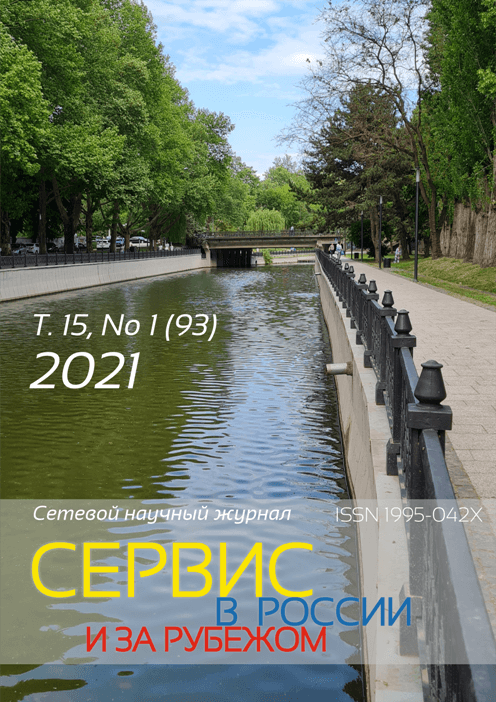Determination of the natural and ecological potential of St. Petersburg as the basis for the ecological tourism development
DOI:
https://doi.org/10.24412/1995-042X-2021-1-109-121Keywords:
Saint Petersburg, urban environment, ecological tourism, natural and ecological potential, green spaces, natural objects, nature reserves, natural monuments, parks, gardensAbstract
The research is focused on ecological tourism, the main objects of which are specially protected natural areas (SPNA) and other natural objects (gardens, parks, squares, etc.). The study is aimed at spatial analysis of the natural and ecological potential and determine the prospects for the ecological tourism development in the administrative districts of St. Petersburg. The hypothesis of the study is the determination of the natural and ecological potential of the administrative districts of St. Petersburg and its rational use in organizing ecological tours and excursions should contribute to the manifestation of ecological and socio-economic effects. The methodology for analyzing the natural and ecological potential of St. Petersburg is based on the indicators of the provision of the territory and population with green spaces in the administrative districts of St. Petersburg, determination of their spatial configuration and the identification of potential natural objects for the ecological tourism development. The conducted research shows that the main objects of ecological tourism are in areas adjacent to the coast of the Gulf of Finland. Also, the article identifies the point natural objects of the urban environment, which can also be used in ecotourism activities. Based on the identified natural and ecological potential and the considered experience of other protected areas located near cities, the author gives the proposals for the ecological tourism development in St. Petersburg. The results of the work can be used in tour operator activities in the developing ecological tours and excursions, as well as in the activities of regional authorities in the creating documents on territorial planning, nature management and environmental protection. The directions of future research on this topic should be aimed at identifying socially significant natural and ecological objects that can be used in ecological tourism using appropriate methods. Another direction is to study the positive experience of the functioning of ecological tourism facilities and substantiate the possibilities of its application in urban natural areas.
Downloads
References
Guo R., Miao Ch., Li H. et al. Eco-spatial structure of urban agglomeration // Chinese geographical science. 2007. Vol. 17. №1. Pp. 28-33.
Lebedeva M., Elsukova E., Gadzhieva E., Morozova O. The impact of urban environmental factors on human health // International Multidisciplinary Scientific GeoConference Surveying Geology and Mining Ecology Management, SGEM. 2017. Vol.17. №52. Рp. 1005–1010.
Лебедева М.Ю. Урбанизированные территории как среда обитания современного человека // Мат. XIX междунар. науч.-практ. конф. «Царскосельские чтения» (21–22.04.2015). СПб.: ЛГУ им. А.С. Пушкина, 2015. С. 423-426.
Жуков П.В. Развитие экообразования в детско-юношеском туризме // Мат. II междунар. науч.-практ. конф. «Детско-юношеский туризм: образовательные технологии» (6.12.2016). СПб.: Санкт-Петерб. гос. эконом. ун-т, 2017. С. 84-92.
Финадеева А.А. Экологическое просвещение населения как один из факторов развития экологического туризма в России // Sochi Journal of Economy. 2019. Т.13. №4. С. 452-461.
Eriksson F., Lidström M. Sustainable development in ecotourism. Tour operators managing the economic, social and environmental concerns of sustainable development in Costa Rica. Sweden: Umeа School of Business and Economics, 2013. 68 p.
Nature-based tourism in Russia / Caldito L.A., Dimanche F., Mazina A., Fedulin A. et al. TEMPUS Project «NETOUR: Network for Excellence in Tourism through Organization and Universities in Russia». Project Cofunded by the European Union. Spain, 2015. 76 p.
Куприна Л.Е. Зеленые насаждения: Проектирование учебных экологических троп для школ города: Монография. М.: Флинта: Наука, 2018. 124 с.
Олифир Д.И. Особо охраняемые природные территории Санкт-Петербурга как пространство для развития экологического туризма // Мат. VIII междунар. науч.-практ. конф. «Экологическое равновесие: геоэкология, краеведение, туризм» (10.11.2017). СПб.: ЛГУ им. А.С. Пушкина, 2017. С. 121-126.
Герцберг Л.Я. Стратегическое пространственное планирование (отечественный и зарубежный опыт): Монография. М.: Новая реальность, 2020. 148 с.
Elsukova E., Lebedeva M., Olifir D., Korshunov M. The status and the problems of the forest resourse usage (On the example of the leningrad region) // International Multidisciplinary Scientific GeoConference Surveying Geology and Mining Ecology Management, SGEM. 2017. Vol. 17. №33. Рp. 665-670.
Jun Jie Wu, Cho Seong-Hoon. The effect of local land use regulations on urban development in the Western United States // Regional Science and Urban Economics. 2007. Vol.37. №1. Pp. 69-86.
Лавыгина О.Л. Экология городской среды. Иркутск: ИРНИТУ, 2019. 146 с.
Урбанистика и экология городских территорий / Л.Н. Петрянина, О.Л. Викторова, В.М. Разживин. Пенза: ПГУАС, 2015. 156 с.
Потапова Е.В. Методология анализа состояния озеленённых территорий населенных пунктов: Монография. Иркутск: ИРНИТУ, 2016. 160 с.
Жигунов Э.А., Жигунова Т.С. Проблемы развития экологического туристского потенциала особо охраняемых природных территорий РФ // Мат. VII междунар. науч.-практ. конф. «Экологическое равновесие: структура географического пространства» (11.11.2016). СПб.: ЛГУ им. А.С. Пушкина, 2016. С. 213-220.
Сенчукова А.-Д.С., Изотова Т.В. Возможности и проблемы развития экологического туризма на ООПТ Санкт-Петербурга // Мат. V Всерос. науч.-техн. конф.-вебинара «Леса России: политика, промышленность, наука, образование» (16–18.06.2020). СПб.: Политех-Пресс, 2020. С. 231-233.
Комиссарова Т.С., Скупинова Е.А. ООПТ региона как образовательное пространство // Мат. XVI Всерос. научн. конф. с междунар. уч. «Вузовская наука – регионам» (27.02.2018). Вологда: Вологодский гос. ун-т, 2018. С. 211-214.
Ленинградская область – территория экологического туризма: состояние и перспективы развития / Е.А. Гаджиева, С.В. Писаренко, Э.А. Жигунов и др. СПб.: ЛГУ им. А.С. Пушкина, 2018. 140 с.
Downloads
Published
How to Cite
Issue
Section
License
Copyright (c) 2021 Olifir, D. I.

This work is licensed under a Creative Commons Attribution-NonCommercial-ShareAlike 4.0 International License.












